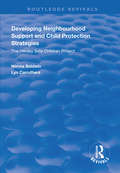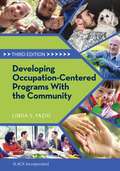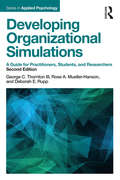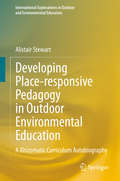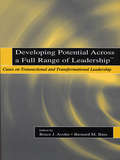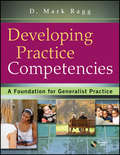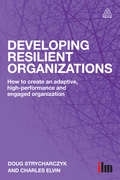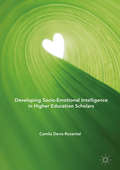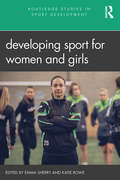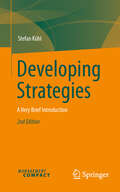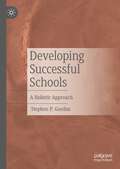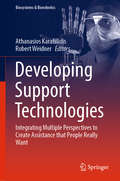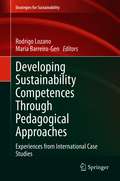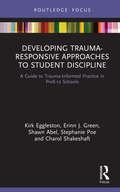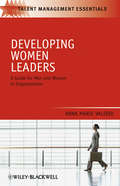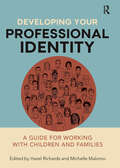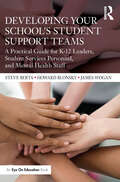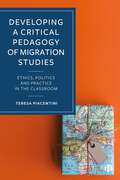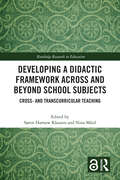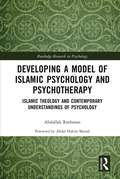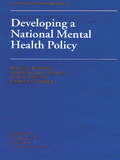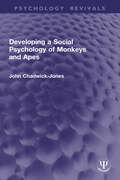- Table View
- List View
Developing Neighbourhood Support and Child Protection Strategies: The Henley Safe Children Project (Routledge Revivals)
by Norma Baldwin Lyn CarruthersPublished in 1998, the book provides a useful contribution to current debates on social exclusion, the regeneration of communities and the refocusing of crisis driven child protection services to family support and the prevention of harm. It stresses the need for interagency strategies of: - neighbourhood and family support - action with young people for a safer environment - principles of partnership with communities - positive action to build on the strengths of families and communities, drawing on their own resources and expertise The detailed account of work to develop such strategies in one neighbourhood will be of value to policy makers, managers and practitioners. The book gives an overview of conditions associated with harm and abuse of children and approaches which can be successful in preventing harm. It documents experience and views of parents - mainly mothers - attempting to bring up their children in health and safety in a severely disadvantaged area. It argues for practical recognition of the links between disadvantage and individual harm, and the need for community development approaches to improve the life chances of children and families.
Developing Occupation-Centered Programs with the Community
by Linda S. FazioThe Third Edition includes new and updated content on evidence-based practice; program evaluation at multiple levels; funding; nonprofits and social entrepreneurship. Additionally, new trending issues of interest to programmers include human trafficking, post-combat programming for military veterans and their families, arts-based programming for all ages, and programming to meet current needs of the well-elderly. The features of the Third Edition are: Workbook format offers the instructor and the student options for how to use the text in a classroom or independently in an internship or residency. <P><P> The order of the programming process, chapter content order, summaries, and format of exercises has been retained to ease transition for instructors using previous editions of the text. The program “story” section has been retained, along with author’s notes on what is currently happening with these programs and other related topic areas. New content has been added in program sustainability, the assessment and building of community assets, and consensus organizing in communities. More developed content is offered about the structure and function of nonprofit organizations as well as the role and function of the social entrepreneur who does programming for these organizations.
Developing Organizational Simulations: A Guide for Practitioners, Students, and Researchers (Applied Psychology Series)
by Deborah E. Rupp George C. Thornton III Rose A. Mueller-HansonThis second edition of Developing Organizational Simulations provides a concise source of information on effective and practical methods for constructing simulation exercises for the assessment of psychological characteristics relevant to effectiveness in work organizations. Incorporating new additions such as the multiple ways technology can be used in the design, delivery, scoring, and evaluating of simulation exercises, as well as the delivery of feedback based on the results, this book is user-friendly with practical how-to guidance, including many graphics, boxes, and examples. This book is ideal for practitioners, consultants, HR specialists, students, and researchers in need of guidance developing organizational simulations for personnel selection, promotion, diagnosis, training, or research. It is also suited for courses, workshops, and training programs in testing and measurement, personnel selection, training and development, and research methodology.
Developing Place-responsive Pedagogy in Outdoor Environmental Education: A Rhizomatic Curriculum Autobiography (International Explorations in Outdoor and Environmental Education)
by Alistair StewartThis book is a rhizomatic curriculum autobiography that charts the author’s efforts to develop and promote Australian outdoor environmental education practices that are inclusive of, and responsive to, the places in which they are performed. Joining philosophical concepts created by Gilles Deleuze and Felix Guattari with William Pinar’s autobiographical method for curriculum inquiry, the author (re)considers the interrelated concepts, contexts and complex conversations with colleagues, students and others that have shaped his approach to curriculum, pedagogy and research for fifteen years or more. Emphasising the complexity of developing curricula and pedagogies that engage, in a respectful and generative way, with the natural and cultural history of the Australian continent, the author explicates and enacts his attempts to think differently about the cultural, curricular and pedagogical understandings that inform the practices of Australian outdoor environmental educators. Outdoor environmental education in Australia has historically been influenced by imported universalist ideas, particularly from the USA and the UK. However, during the last two decades a growing number of researchers in this field have challenged the applicability of such taken-for-granted approaches and advocated the development of curricula and pedagogies informed by the unique bio-geographical and cultural histories of the locations in which educational experiences take place. As this book demonstrates, Alistair Stewart is prominent among the vanguard of Australian outdoor environmental educators who have led such advocacy by combining practical experience with theoretical rigour.
Developing Potential Across a Full Range of Leadership TM: Cases on Transactional and Transformational Leadership
by Bernard M. Bass Bruce J. AvolioThis case book focuses on the leadership style of the key players. The 29 cases were chosen to present all facets of a model of leadership, stating that the most effective leaders are both transformational and transactional in their leadership style. Cases were selected for inclusion and/or developed to provide examples of leaders from across the spectrum of public and private sectors. Specific emphasis was placed on selecting male and female leaders from a broad array of cultures. A great deal has been written about a model of leadership that is referred to as a "full range" of leadership potential. This book adds to the literature, by highlighting specific people who exemplify the various styles and orientations regarding a full range of leadership potential. The book begins with an overview of what constitutes transactional and transformational leadership. This discussion is then expanded to include a Full Range of Leadership PotentialTM. Discussion of the cases highlight how to build balance in one's leadership profile to optimize the potential of leaders, followers, and their organizations. The presence or absence of styles in a wide variety of contexts will be discussed in terms of the effects on individuals, groups, or organizations. Questions are posed for discussion of each case. Practitioners who conduct or facilitate the training of leadership will find this book quite useful to their work. In addition, managers interested in developing their own leadership potential will be enabled to learn by example how different styles affect leadership performance. This book can also be used as a supplement to other books on leadership for undergraduate, graduate, and executive education courses in management.
Developing Practice Competencies
by D. Mark RaggAn applied, experiential introduction for the development of generalist practice skills in the helping professions Designed to help students in social work and human services programs establish a solid skill foundation for professional practice, Developing Practice Competencies holistically organizes this content knowledge through a consistent framework integrated throughout the book. Developing Practice Competencies explores: How to build on current interpersonal skills to develop a professional identity and a specialized repertoire of intervention skills How to work competently with diverse client groups taking into account the cultural and social contexts of each client situation Ways to engage individuals and larger client systems in focused work toward client-specific goals Successfully managing the nuances and challenges of the helping relationship Combining specific skills for use in evidence-based models Filled with rich examples, role-plays, and exercises, Developing Practice Competencies covers the foundation competencies necessary for students preparing to work with individuals, families, groups, organizations, and communities on behalf of underserved and socially compromised people. An accompanying DVD offers video of the practice skills in action and electronic versions of exercises for classroom discussions.
Developing Resilient Organizations
by Doug Strycharczyk Charles ElvinMuch of the fear and uncertainty surrounding the global recession is concerned with the adverse impact it will have on organisations and society. However, recessions are nothing new. We know from past experience that when a recession is over, there always emerge organisations and individuals who have not only survived but have thrived. They often emerge stronger, fitter and better performing. Developing Resilient Organizations argues that one of the fundamental keys to survival in these circumstances is resilience or mental toughness. It can make challenge and change an opportunity rather than a threat. The book addresses a wide variety of organizational issues including motivation, performance, staff retention, behaviour, trust, attention span and teamwork. With case studies from leading organizations across the public and private sector internationally, it will show you how to develop organizational performance, well being and a positive approach to adversity and change in your organization.
Developing Resilient Organizations: How to Create an Adaptive, High-Performance and Engaged Organization
by Doug Strycharczyk Charles ElvinMuch of the fear and uncertainty surrounding the global recession is concerned with the adverse impact it will have on organisations and society. However, recessions are nothing new. We know from past experience that when a recession is over, there always emerge organisations and individuals who have not only survived but have thrived. They often emerge stronger, fitter and better performing. Developing Resilient Organizations argues that one of the fundamental keys to survival in these circumstances is resilience or mental toughness. It can make challenge and change an opportunity rather than a threat. The book addresses a wide variety of organizational issues including motivation, performance, staff retention, behaviour, trust, attention span and teamwork. With case studies from leading organizations across the public and private sector internationally, it will show you how to develop organizational performance, well being and a positive approach to adversity and change in your organization.
Developing Socio-Emotional Intelligence in Higher Education Scholars
by Camila Devis-RozentalThis book explores the impact of socio-emotional intelligence on wellbeing in higher education. Stemming from years of investigation and educational expertise with trainee teachers and academics, the book identifies ways in which socio-emotional intelligence can be developed in university environments. The author begins by analysing the concept of socio-emotional intelligence and its development, before confronting distinctive areas for improvement within the context of teaching and learning in higher education. The book explores the importance of understanding and labelling emotions, and how opportunities for self-reflection arise through an environment that meets practical needs. The author contends that support from other scholars is vital to the development of socio-emotional intelligence. The book concludes with a set of practical suggestions for promoting personal development. It will be a valuable resourse for anyone working in higher education who is interested in improving their own wellbeing and that of those around them.
Developing Sport for Women and Girls (Routledge Studies in Sport Development)
by Emma SherryWomen and girls are often excluded from organised sport or face challenges in accessing sport or developing within sport. This is the first book to focus on sport development for women and girls. It provides a theoretical and practical framework for readers in the emerging field of sport development. Developing Sport for Women and Girls examines both the development of sport, and development through sport with expert contributions from Australasia, North America and Europe. It offers critical analysis of contemporary sport development, from high performance pathways to engaging diverse communities to the use of sport to empower women and girls. Each chapter explores various contexts of sport development and sport for development theory with a specific focus on women and girls. It covers key topics such as health, education, sexual orientation and participation across the lifecourse, and features international case studies in every chapter. This is essential reading for students, academics, researchers and practitioners working in the area of sport development or sport management.
Developing Strategies: A Very Brief Introduction
by Stefan KühlHardly any other management concept is as overused as strategy, yet at the same time hardly any other concept is as vaguely defined. As a means of escaping the conceptual jumble, this monograph suggests a systems-theoretical definition which makes it possible to sort out the various threads of the strategy discussion. Strategies are &“search programs&” used for finding the means to achieve previously defined goals. With these, we let classical ideas about strategy confront modern organizational theory, and demonstrate how strategy development in organizations can look beyond purpose rational constraints.
Developing Successful Schools: A Holistic Approach
by Stephen P. GordonThis book identifies and emphasizes the need for a holistic approach to school improvement when it comes to both the development of the whole child and the relationships among student, family, and community development. In recent years, the emphasis in PK-12 education in the United States has been on the measurement of student and school performance by high-stakes achievement tests. This emphasis has resulted in a narrowed curriculum emphasizing lower-level cognitive learning, with little attention paid to the moral, social, and creative development of students, families, and communities. This book argues that PK-12 education needs to shift its focus to holistic qualities of the successful school, qualities that reflect a moral rather than a technical approach to education while also improving students’ academic performance.
Developing Support Technologies: Integrating Multiple Perspectives to Create Assistance that People Really Want (Biosystems & Biorobotics #23)
by Athanasios Karafillidis Robert WeidnerThis book shows the advantages of using different perspectives and scientific backgrounds for developing support technologies that are integrated into daily life. It highlights the interaction between people and technology as a key factor for achieving this integration and discusses relevant methods, concepts, technologies, and applications suitable for interdisciplinary exchange and collaboration. The relationship between humans and technology has become much more inclusive and interdependent. This generates a number of technical, ethical, social, and practical issues. By gathering contributions from scholars from heterogeneous research fields, such as biomechanics, various branches of engineering, the social sciences, information science, psychology, and philosophy, this book is intended to provide answers to the main questions arising when support technologies such as assistance systems, wearable devices, augmented reality, and/or robot-based systems are constructed, implemented, interfaced and/or evaluated across different application contexts.
Developing Sustainability Competences Through Pedagogical Approaches: Experiences from International Case Studies (Strategies for Sustainability)
by Rodrigo Lozano Maria Barreiro-GenThis book is aimed at developing sustainability competences through pedagogical approaches by comparing 15 case studies from 12 countries in 4 continents (Africa, America, Australia, and Europe) analysing how Sustainable Development (SD) is being taught in their courses, which competences are being developed, and which pedagogical approaches are being used to develop the competences. The book brings together practice-based original research on the connection between developing sustainability competences and the pedagogical approaches used, utilizing a framework aimed at helping educators in creating and updating their courses to provide a more complete, holistic, and systemic sustainability education to future leaders, decision makers, educators, and change agents. Compared to previous works addressing SD in education, which often mostly cover tools for improving the sustainability of campus operations, this approach uses assessment tools to uniquely focus on how courses and programmes (i.e. curricula) incorporate SD. Through the case studies, readers will learn about how the 3 major groups of pedagogical approaches have been used: (1) Universal, meaning broadly applicable pedagogies that have been used in many disciplines and contexts; (2) Community and social justice, which are pedagogies developed specifically for use in addressing social justice and community-building; and (3) Environmental education, which are pedagogies emerging from environmental sciences and environmental education practices.
Developing Trauma-Responsive Approaches to Student Discipline: A Guide to Trauma-Informed Practice in PreK-12 Schools (Routledge Research in Education)
by Charol Shakeshaft Kirk Eggleston Erinn J. Green Shawn Abel Stephanie PoeBuilding on comprehensive research conducted in US schools, this accessible volume offers an effective model of school leadership to develop and implement school-wide, trauma-responsive approaches to student discipline. Recognizing that challenging student behaviours are often rooted in early experiences of trauma, the volume builds on a model from the Substance Abuse and Mental Health Services Administration (SAMHSA) to walk readers through the processes of realizing, recognizing, responding to, and resisting the impacts of trauma in school contexts. Research and interviews model an educational reform process and explain how a range of differentiated interventions including Positive Behaviour Interventions and Supports (PBIS), social-emotional learning (SEL), restorative justice, and family engagement can be used to boost student resilience and pro-social behaviour. Practical steps are supported by current theory, resources, and stories of implementation from superintendents, principals, and teachers. This text will benefit school leaders, teachers, and counsellors with an interest in restorative student discipline, emotional and behavioural difficulties in young people, and PreK-12 education more broadly. Those interested in school psychology, trauma studies, and trauma counselling with children and adolescents will also benefit from the volume.
Developing Trauma-Responsive Approaches to Student Discipline: A Guide to Trauma-Informed Practice in PreK-12 Schools (Routledge Research in Education)
by Charol Shakeshaft Kirk Eggleston Erinn J. Green Shawn Abel Stephanie PoeBuilding on comprehensive research conducted in US schools, this accessible volume offers an effective model of school leadership to develop and implement school-wide, trauma-responsive approaches to student discipline.Recognizing that challenging student behaviours are often rooted in early experiences of trauma, the volume builds on a model from the Substance Abuse and Mental Health Services Administration (SAMHSA) to walk readers through the processes of realizing, recognizing, responding to, and resisting the impacts of trauma in school contexts. Research and interviews model an educational reform process and explain how a range of differentiated interventions including Positive Behaviour Interventions and Supports (PBIS), social-emotional learning (SEL), restorative justice, and family engagement can be used to boost student resilience and pro-social behaviour. Practical steps are supported by current theory, resources, and stories of implementation from superintendents, principals, and teachers. This text will benefit school leaders, teachers, and counsellors with an interest in restorative student discipline, emotional and behavioural difficulties in young people, and PreK-12 education more broadly. Those interested in school psychology, trauma studies, and trauma counselling with children and adolescents will also benefit from the volume.
Developing Women Leaders
by Anna Marie ValerioDeveloping Women Leaders answers the question "How do we best develop women leaders?" with practical solutions drawn from current literature and the author's personal interviews with high-achievers in major US companies and universities.Presents research-based, practical solutions to help people in organizations develop talented womenDescribes what organizations and individuals need to know about leadership competencies, personality, and leadership stylesExplains gender-related issues that affect the behaviors of both women and men at workIntegrates first-hand accounts by high-achieving women and men from major US companies and universities about their leadership experiencesSeparate chapters addressed to CEOs and Human Resource executives, managers, and women offer practical suggestions to implement in their organizations, using examples from some 'best practice' companiesHas relevance across the range of all organizations including Fortune 500 companies, academic institutions, non-profit organizations and small businessesHas significance for every aspect of society - business, government, law, families, careers, and health
Developing Your Professional Identity: A guide for working with children and families
by Hazel Richards Michelle MalomoA reflective guide for all those studying for the range of professional disciplines within the area of children and families. Written by a multi-disciplinary team, this book provides students and practitioners with opportunities to reflect upon work-based placement challenges and solutions within a variety of settings, supporting employability and the development of a professional identity. Practical and practice-based, it addresses issues of self-confidence, voice and agency, resilience and self-care, relationships and partnerships, risk assessments and reflective practice, all within the context of children and families. Chapters take a supportive and reflective approach, including clear objectives, case studies, critical questions and spotlights on new debates, helping to build essential skills and promoting a clear sense of self as individuals transition from student to professional.
Developing Your School’s Student Support Teams: A Practical Guide for K-12 Leaders, Student Services Personnel, and Mental Health Staff
by Steve Berta Howard Blonsky James WoganDeveloping Your School’s Student Support Teams is a practical manual for schools seeking to establish and sustain coordinated teams in support of students’ social, emotional and behavioral health. Every day, students struggle with a range of issues, including traumas, that complicate their learning, engagement, and overall well-being. School psychologists, counselors, social workers and nurses are employed in many school districts, but their schedules often make it difficult to collaborate effectively in developing and implementing comprehensive intervention plans. This book promotes teamwork throughout schools by exploring how interdependent practitioners can come together at the appropriate levels and times to help coordinate school and community resources. This "filtering" process will guide K-12 leaders and service professionals toward systems and decision-making that enable long-term student supports, accurate identification of systemic learning barriers, improved school culture and climate, attention to diverse populations, and more. With these proactive teamwork strategies, school staff will be better prepared to share workload and accountability and to identify and build upon the existing strengths and supports of every student.
Developing Your School’s Student Support Teams: A Practical Guide for K-12 Leaders, Student Services Personnel, and Mental Health Staff
by Steve Berta Howard Blonsky James WoganDeveloping Your School’s Student Support Teams is a practical manual for schools seeking to establish and sustain coordinated teams in support of students’ social, emotional and behavioral health. Every day, students struggle with a range of issues, including traumas, that complicate their learning, engagement, and overall well-being. School psychologists, counselors, social workers and nurses are employed in many school districts, but their schedules often make it difficult to collaborate effectively in developing and implementing comprehensive intervention plans. This book promotes teamwork throughout schools by exploring how interdependent practitioners can come together at the appropriate levels and times to help coordinate school and community resources. This "filtering" process will guide K-12 leaders and service professionals toward systems and decision-making that enable long-term student supports, accurate identification of systemic learning barriers, improved school culture and climate, attention to diverse populations, and more. With these proactive teamwork strategies, school staff will be better prepared to share workload and accountability and to identify and build upon the existing strengths and supports of every student.
Developing a Critical Pedagogy of Migration Studies: Ethics, Politics and Practice in the Classroom
by Teresa PiacentiniMigration as a taught subject is entrenched in social and political debates, with the classroom firmly framed as a site of committed social and political encounter. That means teaching migration through the prism of critical pedagogy is a political and ethical necessity. This book invites readers to examine their own relationships with migration, ethics, politics and power. It encourages teachers, students and practitioners to think critically about their position in relation to the knowledge they both bring and gain. With pedagogical features that provide space for reflection and discussion, this is a transformative resource in reshaping how we teach and learn about migration.
Developing a Didactic Framework Across and Beyond School Subjects: Cross- and Transcurricular Teaching (Routledge Research in Education)
by Søren Harnow Klausen Nina MårdCentered around a contemporary conception of Bildung, this book effectively demonstrates how the aims of cross- and transcurricular teaching can be reconciled, resulting in a didactic framework for teaching and learning in secondary schools that can be applied internationally. Chapters present a nuanced and unified approach to fusing theory and practice by offering accounts of some of the most promising teaching methods from leading scholars in the field of curriculum research. These methods include dialogic teaching or movement integration, transversal competences like digital or entrepreneurial thinking, and topics that call for crosscurricular approaches, like sustainability or citizenship. Addressing diverse worries and criticisms of crosscurricular teaching, the book includes international viewpoints and trends such as sustainability, citizenship, and student motivation to present a comprehensive and systematic scholarly treatment of crosscurricular didactics within the classroom. It further addresses important challenges that have been widely ignored, like how to evaluate crosscurricular work. Ultimately, this volume makes a highly novel contribution to the field of crosscurricular didactics, and will be of interest to researchers, scholars, and academics in the fields of secondary education teaching and learning, educational science, and curriculum design. Those interested more broadly in the theory of education will also find the volume of use. The Open Access version of this book, available at www.taylorfrancis.com, has been made available under a Creative Commons Attribution- Non Commercial-No Derivatives (CC-BY-NC-ND) 4.0 license.
Developing a Model of Islamic Psychology and Psychotherapy: Islamic Theology and Contemporary Understandings of Psychology (Routledge Research in Psychology)
by Abdallah RothmanAt a time when there is increasing need to offer psychotherapeutic approaches that accommodate clients’ religious and spiritual beliefs, and acknowledge the potential for healing and growth offered by religious frameworks, this book explores psychology from an Islamic paradigm and demonstrates how Islamic understandings of human nature, the self, and the soul can inform an Islamic psychotherapy. Drawing on a qualitative, grounded theory analysis of interviews with Islamic scholars and clinicians, this unique volume distils complex religious concepts to reconcile Islamic theology with contemporary notions of psychology. Chapters offer nuanced explanations of relevant Islamic tradition and theological sources, consider how this relates to Western notions of psychotherapy and common misconceptions, and draw uniquely on first-hand data to develop a new theory of Islamic psychology. This, in turn, informs an innovative and empirically driven model of practice that translates Islamic understandings of human psychology into a clinical framework for Islamic psychotherapy. An outstanding scholarly contribution to the modern and emerging discipline of Islamic psychology, this book makes a pioneering contribution to the integration of the Islamic sciences and clinical mental health practice. It will be a key resource for scholars, researchers, and practicing clinicians with an interest in Islamic psychology and Muslim mental health, as well as religion, spirituality and psychology more broadly.
Developing a National Mental Health Policy (Maudsley Series #No. 43)
by Andrew McCulloch Rachel Jenkins Lynne Friedli Camilla ParkerMental illness causes a substantial health burden in all regions of the world, and is a major contributor to world poverty.Developing a National Mental Health Policy is designed to support those involved in developing locally appropriate mental health policies, emphasising the crucial role of primary care, NGOs, the social sector, schools and workplaces, and the criminal justice system as well as the specialist mental health services.The book addresses the principles of human rights, mental health legislation, mental health information systems, human resources, accountability and financing as well as key cultural issues. It gives a comprehensive and up to date account of the task of tailoring mental health services to the needs of countries in the post-institutional era.
Developing a Social Psychology of Monkeys and Apes (Psychology Revivals)
by John Chadwick-JonesOriginally published in 1998, the aim of Developing a Social Psychology of Monkeys and Apes was to draw attention to the exciting progress of studies of the social psychology of monkeys and apes happening at the time. It is written with a clear style which should invite interest from a wide range of social scientists. The relatedness of humans and non-human primates that was usually considered in its genetic forms is followed through into the complex social tactics of monkeys and apes. The focus of the book was on the latest research as it had developed out of earlier classic studies. The wave of researchers working on social topics at the time is especially emphasized.This book will be of particular interest to primatologists, ethologists, anthropologists, zoologists, social psychologists, and students of social cognition and social interaction. For students, the appendices provide useful information on the variety of social structures of Old World and New World monkeys and apes.
